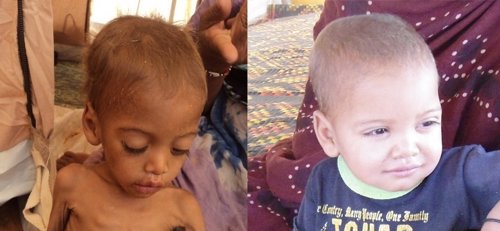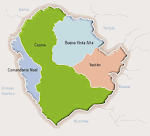UNICEF:19,000 NIÑOS MUEREN CADA DÍA Y NI LO SENTIMOS …
KUNA : Estimated 19,000 children still died every day in 2011 – UN REPORT
Infancia.- UNICEF denuncia que 19.000 niños mueren cada día por causas evitables, un tercio de ellos por desnutrición

Recuerdan que solo se ha donado el 40 por ciento de la ayuda urgente solicitada para hacer frente a la hambruna en el Sahel
MADRID, 19 Nov. (EUROPA PRESS) -El Fondo de Naciones Unidas para la Infancia (UNICEF) ha denunciado este lunes que 19.000 niños mueren cada día en el mundo por causas evitables y que un tercio de éstos lo hacen, de manera directa o indirecta, por desnutrición, según un informe publicado con motivo del Día Universal del Niño, que se celebra este martes en conmemoración de la firma de la Convención sobre los Derechos del Niño.
http://www.europapress.es/internacional/noticia-infancia-unicef-denuncia-19000-ninos-mueren-cada-dia-causas-evitables-tercio-ellos-desnutricion-20121119173030.html
En esta línea, la presidenta de UNICEF en España, Consuelo Crespo, ha incidido en que 180 millones de niños son víctimas de la desnutrición crónica, que “mina para siempre su desarrollo físico e intelectual”; mientras que otros 20 millones luchan para hacer frente a la desnutrición aguda severa.
Esta desnutrición, según ha asegurado, es “causa nuclear de la pobreza, la exclusión y la vulnerabilidad” y, a su vez, es “consecuencia” de ellas. No obstante, ha afirmado que se puede evitar y como prueba ha citado el informe ‘Mi hijo ya no come arena’, que se centra en los avances logrados en este tema en Mauritania y que ha sido presentado este martes.
El documento muestra, en palabras de Crespo, que “cuando existe voluntad política, se cuenta con los recursos que la comunidad internacional ha comprometido y con las capacidades y los conocimientos adecuados de las organizaciones” y la ayuda consigue “cambios reales y sostenibles que marcan definitivamente la diferencia en la vida de las personas”.
EN MAURITANIA, 87.000 NIÑOS SALVADOS DE LA DESNUTRICIÓN CRÓNICA
En concreto, en Mauritania se han combinado políticas activas de nutrición, seguridad alimentaria y protección social y se ha conseguido salvar a 87.000 niños de la desnutrición crónica y evitar así que “coman arena”, como comentaban madres del país a trabajadores de UNICEF. En relación con 1990, en la zona se “ha conseguido reducir la desnutrición crónica a la mitad y, aunque uno de cada cuatro menores de cinco años sigue sufriéndola, esto supone la mitad de lo que sucede en el resto de África”, según ha explicado Crespo.La cooperación oficial española, UNICEF y la propia sociedad a través de esta organización –que ha registrado un aumento de 45.000 socios en los dos últimos años– han contribuido “de forma muy significativa” a este avance ya que, de acuerdo con Crespo, “la ayuda llega y es efectiva”. Además, ha advertido de que ésta “no puede detenerse”.
De hecho, ha afirmado que retirar el apoyo en este momento no solo“congelaría los programas”, sino que “destruiría también buena parte de ellos y, además, desincentivaría los esfuerzos”. Al mismo tiempo, ha lamentado que las agencias que operan en Mauritania solo han recibido 39 millones de dólares de ayuda de los 94 que habían pedido, es decir, algo más de un 40 por ciento. En toda la región del Sahel, las organizaciones han recibido 949 millones de dólares, menos de un 60 por ciento de lo solicitado tras declararse la emergencia por hambruna.
En relación con esta región, la directora ejecutiva de UNICEF en España, Paloma Escudero, ha subrayado que se ha salvado de la desnutrición grave a 600.000 niños y se ha conseguido que no aumente el número de personas afectadas, que no avance el deterioro y que no se declare hambruna. Sin embargo, ha alertado de que sigue habiendo “millones de personas afectadas y un millón de niños en alto riesgo de desnutrición crónica”y ha planteado el “gran reto” de llegar a las personas que se han desplazado por la crisis.
En este contexto, UNICEF ha puesto en marcha la campaña ‘Cumpledías’ contra la desnutrición y por la supervivencia infantil. La iniciativa parte de la idea de que, para los niños que sufren desnutrición, cumplir días es muchas veces un logro y anima a hacer un donativo y a difundir esta idea. Así, para participar se puede enviar un SMS con la palabra UNICEF al número de teléfono 28028 y, por su coste, sufragar un día de tratamiento de la desnutrición aguda. También se puede hacer un donativo a través de la página web ‘www.cumpledias.com‘.

.

Major global variants include a Universal Children’s Day on November 20, by United Nations recommendation

.

.
Accelerating progress on child survival since 2000, UN says
http://www.unicef.org/lac/media_24225.htmNew York/Geneva, 13 September 2012 – The pace of reducing child deaths has accelerated sharply since 2000, according to new data released today by UNICEF, the World Health Organization, the World Bank and the UN Population Division.
An annual report by the UN Inter-agency Group for Child Mortality Estimation (UN-IGME) shows that in 2011, an estimated 6.9 million children died before their fifth birthday, compared to around 12 million in 1990. Rates of child mortality have fallen in all regions of the world in the last two decades – down by at least 50 per cent in Eastern Asia, Northern Africa, Latin America and the Caribbean, South-eastern Asia and Western Asia.
And progress is accelerating: Between 2000 and 2011, the annual rate of reduction in the global under-five mortality rate jumped to 3.2 per cent, up from 1.8 per cent in 1990-2000. Sub-Saharan Africa, the region with the greatest challenge in child survival, has doubled its rate of reduction, from 1.5 per cent per year in 1990-2010 to 3.1 per cent in 2000-2011.
An estimated 19,000 children still died every day in 2011, and around 40 per cent in the first month of life most from preventable causes. And the gains in child survival, although significant, are still insufficient to achieve Millennium Development Goal 4 of reducing the global under-five mortality rate by two-thirds between 1990 and 2015. Only six of the world’s 10 regions are on track to reach the target. Proven solutions need to be expanded to accelerate progress on child survival faster and farther.
Committing to Child Survival: A Promise Renewed is a global movement to accelerate action on maternal, newborn and child survival and build on progress since 1990. More than 100 governments have since June renewed their commitment to child survival.
Sub-Saharan Africa and Southern Asia face the greatest challenges in child survival, and currently account for more than 80 per cent of global under-five deaths. Their disparity with other regions is becoming more marked as regions such as Eastern Asia and Northern Africa have cut child deaths by more than two thirds since 1990.
Half of all under-five deaths occurred in five countries: India (24 per cent), Nigeria (11 per cent), Democratic Republic of the Congo (7 per cent), Pakistan (5 per cent) and China (4 per cent). India and Nigeria account for more than a third of all under-five deaths worldwide.
Globally, the leading causes of death among children under five are pneumonia (18 per cent of all under-five deaths), preterm birth complications (14 per cent), diarrhoea (11 per cent), complications during birth (9 per cent) and malaria (7 per cent).
The UN-IGME 2012 report calls for systematic action to reduce neonatal mortality as the proportion of under-five deaths during the neonatal period is rising in every region and almost all countries. Highly cost-effective interventions are feasible even at the community level. Accelerating the reduction in under-five mortality is possible by expanding preventative and curative interventions that target the main causes of post-neonatal deaths and the most vulnerable children.
For more information, please contact:
Peter Smerdon, UNICEF New York, Tel + 1 212 303 7984, Mobile + 1 917 213 5188, psmerdon@unicef.org
Sarah Crowe, UNICEF Spokesperson, Tel + 1 212 326 7206, Mobile + 1 646 209 1590, scrowe@unicef.org
Fadéla Chaib, WHO Communications Officer and Spokesperson, Tel + 41 22 791 3228, Mobile + 41 79 475 5556, chaibf@who.int
——————-
About UN-IGME
IGME was formed in 2004 to share data on child mortality, harmonize estimates within the UN system, improve methods for child mortality estimation report on progress towards the Millennium Development Goals and enhance country capacity to produce timely and properly assessed estimates of child mortality. The IGME, led by UNICEF and the World Health Organization, also includes the World Bank and the United Nations Population Division of the Department of Economic and Social Affairs as full members.
The 2012 child mortality report has the latest IGME estimates of child mortality at the country, regional and global levels. For more information visit:http://www.childmortality.org/
About UNICEF
UNICEF works in 190 countries and territories to help children survive and thrive, from early childhood through adolescence. The world’s largest provider of vaccines for developing countries, UNICEF supports child health and nutrition, good water and sanitation, quality basic education for all boys and girls, and the protection of children from violence, exploitation, and AIDS. UNICEF is funded entirely by the voluntary contributions of individuals, businesses, foundations and governments. For more information about UNICEF and its work visit:www.unicef.org/lac
About WHO
WHO is the directing and coordinating authority for health within the United Nations system. It is responsible for providing leadership on global health matters, shaping the health research agenda, setting norms and standards, articulating evidence-based policy options, providing technical support to countries, and monitoring and assessing health trends and improving global health security. For more information about WHO and its work, visit http://www.who.int/
.































No hay comentarios:
Publicar un comentario